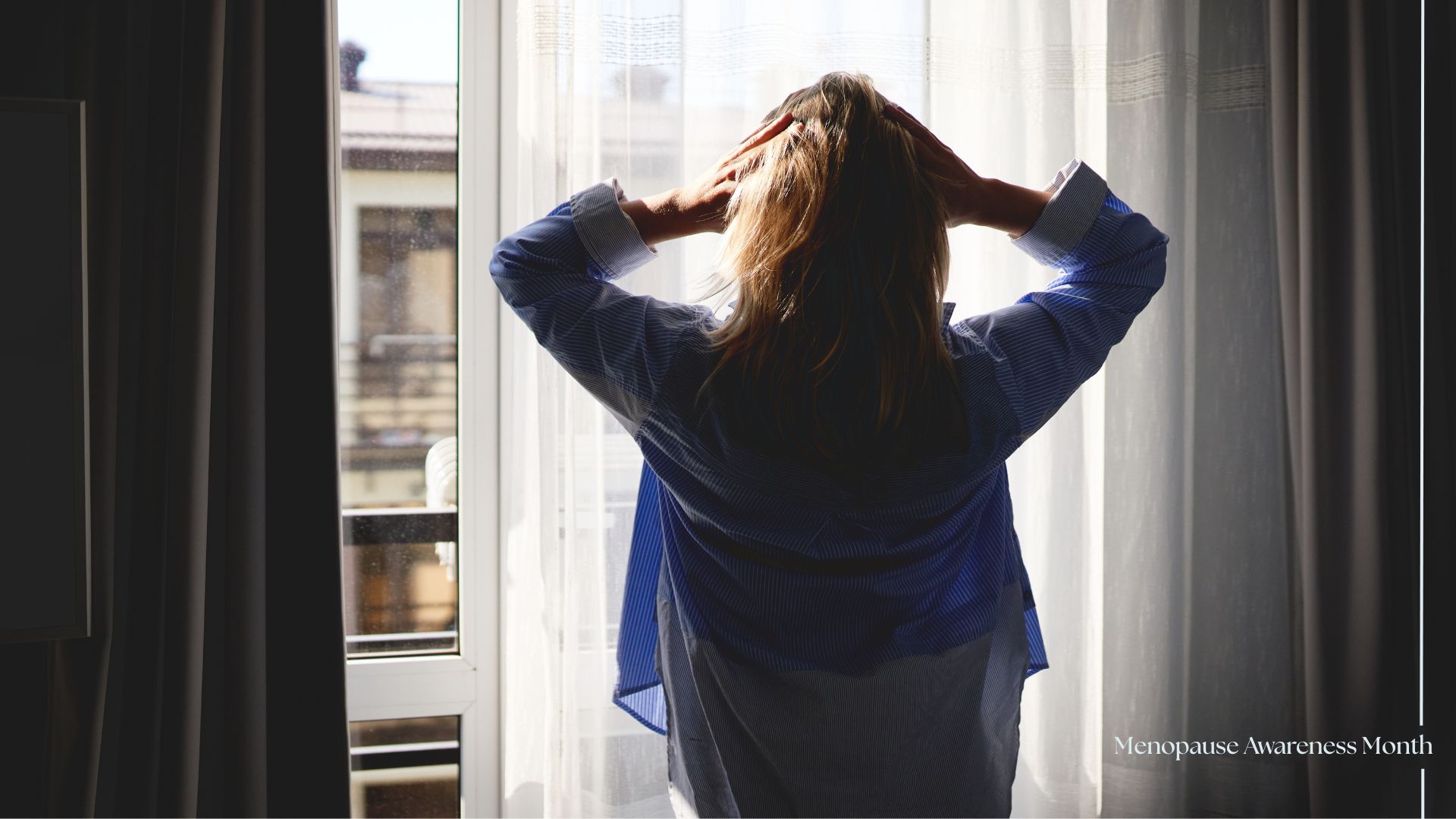What is anhedonia? The menopause symptom you've probably never heard of
Feeling underwhelmed by life could mean you’re experiencing anhedonia, but all is not lost


We often talk about the imbalances that come with menopause, from the hormones themselves to symptoms like mood swings. Rarely do we hear about a symptom of menopause that leaves us feeling flat - irritated, yes, flat, not so much.
Anhedonia is that symptom. It's characterised by low mood and a 'meh' feeling, even when life is good. As one woman I spoke to neatly put it, “It’s like having your emotions turned off".
Despite anhedonia being a recognised symptom of perimenopause and 75% of people with depression (and, conversely, those on antidepressants) experiencing it, we don't discuss it. My personal experience is shame - I can’t justify my disinterest in a life I know I love, but I can’t feel. When I asked around, some of my friends didn't even know there was a word for how they felt.
Keen to know more, I contacted Tanith Carey, a psychotherapy counsellor and author of Feeling 'Blah'?: Why Life Feels Joyless and How to Recapture Its Highs, and Donna Morgan, an integrative counsellor and trauma therapist specialising in menopause.
What is anhedonia?
It’s normal to get fed up or bored occasionally, but anhedonia changes how you engage with life. “You become disconnected from your emotions,” says Donna. “Life becomes muted and flat, and you stop enjoying things that made you feel alive.”
It can feel as if you’re sleepwalking through life, says Tanith. "You may notice things that used to make you feel good don’t do the trick any longer. It could be anything from that celebration you feel you're supposed to be enjoying, to not feeling chills from music you’ve always loved," she says.
"You may also find that senses, like touch and taste, are less intense,” she adds. “No one enjoys life all the time, but if that spiral continues downwards, and you can’t think of anything that makes you feel good anymore, it’s time to take action.”
Sign up to our free daily email for the latest royal and entertainment news, interesting opinion, expert advice on styling and beauty trends, and no-nonsense guides to the health and wellness questions you want answered.
Perimenopause and anhedonia
If you’re peri- or postmenopausal, perhaps you’ve dismissed anhedonia as tiredness, apathy, or getting older. However, hormones (or the lack of them) play a significant role here. “Research from Cambridge University Press shows how menopause alters neurotransmitter activity in the brain, which can affect mood, cognition and emotional resilience. It’s a real, neurobiological experience, not just in your head,” says Donna.
Not only does low oestrogen affect dopamine and serotonin, it buffers the effects of the stress hormone cortisol, so when it falls away, cortisol can get the upper hand, explains Tanith. “Other hormones and neurotransmitters also stop working in harmony - progesterone, a hormone which naturally calms you, also drops off. Meanwhile, to add to the mix, testosterone, which gives us a sense of confidence, and GABA, a moderating neurotransmitter, also fall away.”
It’s little wonder, then, that anhedonia commonly materialises during this transition. HRT can help, but it’s not an option for all women.
What does anhedonia feel like?
Everyone's hormones are different, so what perimenopause feels like will be different for everyone. I spoke to two women with anhedonia to reveal what the symptom can feel like.
Anonymous, 53
“My anhedonia could be connected to unprocessed trauma, and made worse by perimenopause.”
Anhedonia crept up on me. I didn’t feel sad or low. However, I developed problems with concentration, memory and decision-making and then lost interest in daily activities, even ones I found enjoyable. Everything felt like a chore.
Living with anhedonia feels like the world’s been drained of colour. Food is flavourless, being with friends or family isn’t enjoyable, and TV and films are boring. I spend hours trying to find something – anything – that sparks joy, but all I want to do is sleep or lie on the sofa alone, as I find social interactions draining. It’s like having your emotions turned off and looking at the world through a thick pane of glass. I feel completely disconnected.
I had depression in response to a traumatic life event, so I know what that feels like. This feels different – the symptoms are similar to depression, but I feel more suicidal. In hindsight, I believe it could be connected to unprocessed trauma, made worse by perimenopause.
CBT in menopause enabled me to identify and change negative thought patterns. I set small, manageable daily goals, even if they don’t feel enjoyable at first. This gives me a sense of achievement, even if it’s just texting a friend back.
I'd recommend that people schedule activities that used to bring pleasure, try new activities that might spark interest, or exercise or practice mindfulness to increase awareness and appreciation – even if they don’t immediately feel rewarding. Making an effort to connect with loved ones can provide emotional support.
My mantra is ‘this too shall pass’ and I live by that. I’ve been patient and compassionate with myself, and I set achievable goals, even if it’s having a shower or eating well. I've found that a daily gratitude journal can also be useful.
Anhedonia is isolating and frustrating, but it’s important to remember it’s not a personal failing. It takes time, but keep engaging with the world, even when it’s difficult.
Rhona, 48
“I get numb during stressful periods – more since I developed ME and fibromyalgia, conditions exacerbated by perimenopause and long COVID.”
I hadn't heard of anhedonia until recently. It hit a chord as numbness is something I've described to various counsellors. Cycles can last days, weeks or months. I’ve felt it since childhood. I remember not wanting to play or be around people, or I'd lack enjoyment, curiosity, inspiration, happiness or sadness. Just existing, feeling numb. At uni, I’d frequently feel disconnected, not having joy for life or a desire to do anything. I missed out on a lot, and continue to do so, but at the time, I didn't care.
It’s isolating knowing that you're physically here but not connected to anything or anyone. As an adult, it spills into not having any desire or pleasure in doing anything. I once described it as feeling like an out-of-body experience. I get numb during stressful periods – more since I developed ME and fibromyalgia, conditions exacerbated by perimenopause and long Covid.
I was also recently diagnosed with ADHD and autism. I discovered that I've been having autistic shutdowns since childhood without understanding what they were – I then transition into numb mode. Numbness can also stem from overwhelm. No one identified it other than saying it's a symptom of depression, and while I’ve had treatment for my mental health, no professional mentioned anhedonia.
I’ve started talking to friends – saying it aloud and labelling it is helping me identify it. I think it's also important to recognise feelings and non-feelings (i.e. numbness). You could write your thoughts down when the numbness is apparent, and reflect on it, though the desire to write may be lacking. With age and greater understanding, I’ve found it’s important to keep discussions going. When our experiences are voiced, it can be powerful for someone else.

Changing your diet won't solve everything, but switching from ultra-processed foods to whole foods can make a difference.
What are the symptoms of anhedonia?
"If you’ve stopped enjoying things you love or feel emotionally ‘blank’, pay attention,” says Donna, who recommends you watch for the following:
- Withdrawing from social life
- Dreading the idea of leaving the house or driving
- Lack of motivation or feeling numb around people you care about
- Loss of sexual interest or pleasure
- Feeling like you're going through the motions
Why modern life makes anhedonia worse?
Unfortunately, many aspects of contemporary life harm our brains and our perception of the world. “Our brains were designed to get measured releases of dopamine to motivate us to meet our basic needs, but since convenience became the currency of modern culture, every product and service we use is designed to keep dopamine coming in deluges,” explains Tanith.
“When everything is provided, it’s not surprising that this primal pleasure system gets overloaded and your reward system becomes less sensitive and more blunted. Gradually, your brain’s neurons can lose their dopamine receptors, so it no longer circulates as easily," she says.
Then there’s information overload, which, from an evolutionary viewpoint, our brains struggle to process. “We’re almost constantly in a state of stress due to the always-on nature of tech, world events, the cost-of-living crisis and the 24-hour news cycle,” says Tanith. “This means cortisol levels are constantly raised, with little time to reset, and we feel the effects of elevated cortisol, which makes us feel overwhelmed and burnt-out.”
What's the link between anhedonia and depression?
If you've read this far and are thinking that anhedonia sounds very similar to depression, you're not alone, as the two are often confused by health professionals and those going through it alike. But while concerning and a condition in itself, anhedonia isn’t classed as a mental health disorder.
It is a symptom of numerous conditions, though, including depression, bipolar disorder and PTSD, as well as grief and trauma. It may also be more prevalent in neurodiverse people. It’s thought to be caused by the disruption of, or a deficiency in, the ‘pleasure centre’ of the brain, or an imbalance of neurotransmitters such as dopamine, which is responsible for motivation and reward.
“Anhedonia is often a symptom of major depression, but it’s also a standalone condition, and it doesn’t necessarily mean you’re depressed,” explains Tanith.
Sometimes, we feel it for no obvious reason. "If you have standalone anhedonia, you may not be happy, but you may not be miserable either. There’s a good chance that you often don’t feel like getting out of bed in the morning, but you do anyway," she says.
Is there treatment for anhedonia?
Fortunately, there are various ways to ease anhedonic feelings. “The first is to realise that anhedonia is a ‘thing’ and name it,” says Tanith. “It’s hard to address what we can’t name or describe.”
1. Lifestyle tweaks
Tanith suggests lifestyle tweaks to improve the functioning of your brain's reward system. “Diets high in sugar and preservatives can cause inflammation in the gut and kill microbacteria, which help make feel-good chemicals like serotonin,” says Tanith.
"Eating an anti-inflammatory diet (e.g. more whole foods), encourages the supply of serotonin. Lack of sleep has also been found to interrupt the release of dopamine into the reward system,” adds Tanith, so aim to improve your sleep hygiene and get more core sleep.
2. Find your dopamine hit
Tanith also recommends ‘behavioural activation'. "The principle is that doing something you once enjoyed, no matter how small, is better than doing nothing, even if you don’t feel the good effects right away.”
Try having things in the diary to look forward to, to build dopamine, suggests Tanith.
3. Get around negative thinking patterns
One of the biggest obstacles to overcoming anhedonia is negative thinking patterns. “Our brains are wired to focus on threats (known as negativity bias). It helped our ancestors survive, but now it often keeps us stuck in cycles of fear and emotional shutdown,” says Donna.
“Our minds don’t process negatives well, so when we say, ‘I don’t want to feel numb,’ we’re actually reinforcing that feeling. Instead, reframe. Say, ‘I want to feel reconnected'. This linguistic shift teaches your brain to focus on what you want, not what you’re trying to avoid. Over time, these micro-adjustments can reignite your sense of purpose and pleasure," she says.
4. Reach out for help
Talk to friends, family or a therapist if you're ready to. “Talking therapy can make a massive difference. A good therapist will help you explore what’s going on underneath and give you tools to reframe your thoughts,” says Donna.
You can also ask your GP, but if they’re unsympathetic, “you have every right to ask for a referral or see someone else".
With the right information, therapeutic support and medical care, recovery and reconnection are possible, says Donna. “Start small. Choose one thing each day that brings a flicker of calm, comfort, or joy, and trust that those flickers can grow. You deserve to feel fully alive again.”
Debra Waters is an experienced online editor and lifestyle writer with a focus on health, wellbeing, food and parenting. Currently, she writes for Woman&Home, NOON, and Psychology Now. Previously, Debra was digital food editor at delicious magazine and MSN. She’s written for Everyday Health, Great British Chefs, loveFOOD, M&S Food, Time Out, The Big Issue, The Telegraph, What to Expect, Woman and Woman’s Own. Debra is also an essayist and short story writer.
You must confirm your public display name before commenting
Please logout and then login again, you will then be prompted to enter your display name.
